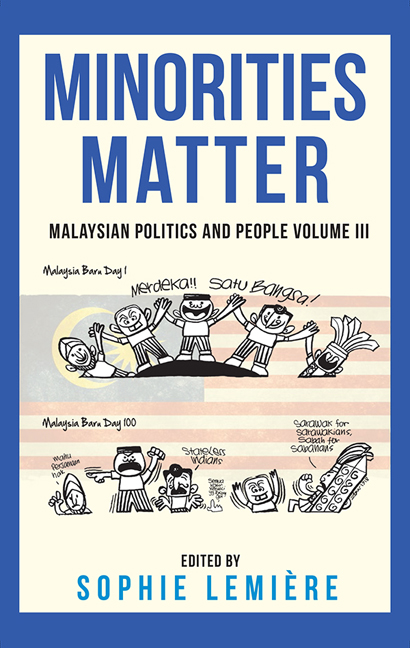Book contents
- Frontmatter
- Contents
- Acknowledgements
- Foreword
- Introduction
- Part I Engaging Politics: The Role of Minorities in GE14 and Beyond
- Part II Building Democracy: Malaysia Baru and the (Im-)possible Reform
- 6 Malaysia – A State of Sanctuary?
- 7 The Image of Laziness and the Malaysian Middle Class: Unpacking the Politics of Indolence
- 8 Poverty, Inequality and Youth Mental Health: Psychological Distress is Political
- 9 Competing Rights Talk and Pakatan Harapan's Incoherent Human Rights Agenda
- 10 The Court of the King of Hearts: The Long Failure of the Malaysian Judiciary – A Legal and Personal Perspective
- List of Contributors
9 - Competing Rights Talk and Pakatan Harapan's Incoherent Human Rights Agenda
from Part II - Building Democracy: Malaysia Baru and the (Im-)possible Reform
Published online by Cambridge University Press: 25 January 2020
- Frontmatter
- Contents
- Acknowledgements
- Foreword
- Introduction
- Part I Engaging Politics: The Role of Minorities in GE14 and Beyond
- Part II Building Democracy: Malaysia Baru and the (Im-)possible Reform
- 6 Malaysia – A State of Sanctuary?
- 7 The Image of Laziness and the Malaysian Middle Class: Unpacking the Politics of Indolence
- 8 Poverty, Inequality and Youth Mental Health: Psychological Distress is Political
- 9 Competing Rights Talk and Pakatan Harapan's Incoherent Human Rights Agenda
- 10 The Court of the King of Hearts: The Long Failure of the Malaysian Judiciary – A Legal and Personal Perspective
- List of Contributors
Summary
By any measure Malaysia's civil and political human rights record has been poor and Malaysians have not enjoyed social, economic and cultural rights in an equitable and non-discriminatory way. The new Pakatan Harapan government's election manifesto promised to fix this. During its first year in office, however, it has not produced a consistent programme. Rather, as the examples of child marriage and racial equality show, when faced with a choice between adopting international human rights standards or heeding ethno-nationalist and religiously based claims, the Pakatan Harapan administration has chosen the latter.
Rights under the Former Regime
It is indisputable that the fundamental civil and political rights and freedoms Malaysians are ostensibly guaranteed by the Federal Constitution have long been abridged by draconian laws and policies administered by successive United Malays National Organisation (UMNO)-led Barisan Nasional (BN) governments. It is also beyond doubt that Malaysians’ enjoyment of the internationally recognised human rights they could expect their government to protect and promote – because it has repeatedly promised to do so – has similarly been compromised (Whiting, 2013). Within the vast United Nations (UN) human rights apparatus, trenchant criticisms have been made during the cyclical reviews conducted by the committees established under the International Convention to Eliminate All Forms of Discrimination Against Women (CEDAW) and the Convention on the Rights of the Child (CRC), and during the UN Human Rights Council (HRC) Universal Periodic Review Process (the UPR) in 2009 (UPR1, 1st cycle) and 2013 (UPR2, 2nd cycle). With vengeful and embattled UMNO's narrow return to power in the 13th general election in May 2013, the situation became dire (Whiting, 2017).
At the same time, it must be conceded that the old regime's state development plans and policies delivered significant advances in education, employment and health (Gomez and Saravanamuttu, 2013) – what might, through another lens, be termed economic and social human rights. A price for these socio-economic achievements, however, has been the erosion of civil and political liberties, and racial and religious polarisation (Munro-Kua, 2017). It is thus also indisputable that the politicisation of religion and ethnicity have infected, rather than enriched, the public sphere (Welsh, 2018a).
- Type
- Chapter
- Information
- Minorities MatterMalaysian Politics and People Volume III, pp. 148 - 163Publisher: ISEAS–Yusof Ishak InstitutePrint publication year: 2019



